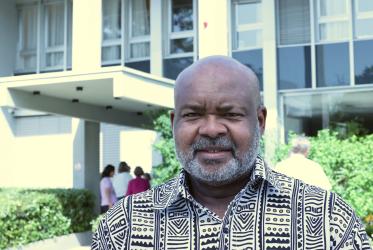The World Council of Churches (WCC) fellowship joins the family and friends of Prof. John Samuel Pobee in celebrating his life and ministry and grieving his death on 22 January.
Pobee, was born in Cape Coast, Ghana. He was a New Testament scholar, theologian, writer, mentor, educator, ecumenist and missiologist who was ordained as an Anglican priest and canon in 1988. Born on 9 July 1937 of an educationist family and a descendant of Rev. Phillip Quaque, the first African ever to be ordained in the Church of England (Anglican) on his mother’s side, Pobee was educated in Ghana, taking his doctorate in 1966 at University of Cambridge. He taught religion and theology at the University of Ghana, becoming a professor in 1981 and professor emeritus in 2000.
Pobee was introduced to the WCC in 1972 by Rev. Fr Desmond Tutu, then on the staff of the Theological Education Fund based in the UK as assistant director with responsibility for Africa. The encounter with Tutu led Pobee to become a member of the Commission for the Theological Education Fund which afforded him numerous opportunities to engage with prominent theologians and church leaders from a wide spectrum of denominations and continents. In his autobiography Sense of Grace and Mission Pobee acknowledges that these encounters helped him to learn that ecumenism entailed opening up to and engaging the other, different as they may be. He could never again be the narrow faithful Anglican and Ghanaian. He began the journey to becoming a world citizen and an ecumenical Christian.
At the 6th WCC Assembly in 1983 Pobee was appointed associate director of the Programme of Theological Education in Geneva, from January 1984, a position he held until the 8th WCC Assembly in December 1998 as the coordinator of Ecumenical Theological Education. During these 15 years with WCC, Pobee was involved in teaching at the Bossey Ecumenical Institute and served as the academic dean. Pobee continued to be an external examiner and visiting professor in many tertiary institutions in Africa, India, the Philippines, Indonesia, Australia, the Pacific, Latin America, West Indies, USA, United Kingdom, and the Netherlands.
At Bossey, students used to refer to Pobee as the “president of the world!” During his journey, he opened many ecumenical doors for many young theological students especially from the global South and introduced them to the WCC by ensuring that they studied ecumenical theology and exposed them to WCC gatherings that opened their horizons beyond their local contexts. In particular, Pobee had a commitment for the inclusion of women in theological education, ministerial formation and church leadership, including ordained ministry.
WCC general secretary Rev. Dr Olav Fykse Tveit commended Pobee’s long and rich influence on young people who went on to form the heart of the ecumenical movement. “We are grateful for both his vast array of knowledge and, even more, for his dedication to sharing it with those who will carry on," said Tveit. "We pray for his family and loved ones, and we will embrace his legacy with respect and affection."
Prof. Mercy Amba Oduyoye, former WCC deputy general secretary and a fellow Ghanaian acknowledged the servant role (“backroom boy,” in his words) Pobee played in the inauguration of the Circle of Concerned African Women Theologians in 1989, in Accra, Ghana. In this context, Pobee himself said “a group of women led him to put ‘women in theology’ on the agenda.” He also initiated and published some volumes on women in theology.
WCC deputy general secretary Dr Isabel Apawo Phiri reflects: “What Pobee did through the WCC is unforgettable. He truly had the empowerment of young ecumenists from the global south at heart.”
Pobee was the first African president of the International Association of Mission Studies (1988 – 1992) which explains why his theological writings span ecumenism and missiology.





